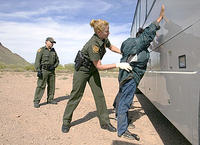-
Coast Guard works to prevent rising mission-related deaths
Admiral Robert Papp, the commandant of the U.S. Coast Guard (USCG), announced that the service is conducting a comprehensive review and may eliminate certain missions and capabilities, in light of the sharp increase of mission related deaths; in the past two years, fourteen Coast Guard aviators and one Maritime Safety and Security Team (MSST) member have died in accidents that occurred during routine missions; Admiral Papp is concerned that service members are overburdened by training for too many different skill sets and have had inadequate time to master them; since 9/11 USCG has added missions and capabilities without a corresponding increase in service personnel; Papp cites a helicopter crash in July 2010 that killed three aviators as evidence; the crash occurred during a routine mission in which the team was flying from Astoria, Oregon to Sitka, Alaska
-
-
Obama asks for $43.8 billion for DHS -- 2 percent increase over 2011

TSA hopes to buy more full-body scanners; already TSA has deployed nearly 500 of the scanners at 78 airports, and Obama’s budget proposed having as many as 1,275 installed by the end of 2012; the proposed budget also includes additional funds, about $3 billion, better to protect against a chemical, biological, nuclear, or radiological attack as well as critical infrastructure like power grids
-
-
FDA looks for ways to fund $1.4 billion Food Safety Reform Act
Food-borne illness strikes 40 million Americans, hospitalizing 100,000, and killing thousands each year; on 4 January President Obama signed the long-awaited FDA Food Safety and Modernization Act into law — sweeping legislation that overhauls U.S. food-safety laws for the first time in more than seventy years; the Congressional Budget Office (CBO) estimated the food-safety law would cost about $1.4 billion in its first five years, including the cost of hiring an estimated 2,000 additional food inspectors; the passage of the legislation now presents FDA with the question of how to procure the funding required to implement and enforce the new system
-
-
Pentagon's budget cuts could signal future Homeland Security cuts
National security budgets are no longer safe from cuts; lawmakers are increasingly targeting military, veterans, and Homeland Security budgets for cuts despite agreements and precedent to the contrary; on Thursday the Pentagon announced over $150 billion in savings that include $78 billion in budget cuts and a potential increase in fees for veterans’ healthcare; DHS cuts could be on their way next
-
-
Closing of U.K. forensics research centers triggers protest
The U.K. government announced that the Forensic Science Service — a leading research center based in Birmingham, United Kingdom — will be closed by 2012 because of budgetary reasons; law enforcement leaders and scientists calls on the government to reconsider the decision, saying that “The reputation of forensic science in the U.K. will undoubtedly diminish —- The lack of research means that we will be lagging behind the rest of the world, and justice will suffer”
-
-
New congressional majority could scale back U.S. science budgets
President Barack Obama has ordered all federal agencies that are not linked to national security to reduce by 5 percent their budget requests for 2012 compared to the 2011 budget year; if Republicans hold to their pre-election pledge, non-defense related federal research spending could dip more than 12 percent to around $58 billion — compared to $66 billion requested by the White House for 2011
-
-
U.K. outlines counter-terrorism priorities
The Home Secretary’s priorities are to: enhance protective security measures, invest in conflict prevention and stopping overseas terrorist plots, refocus the U.K. strategy for preventing radicalization, and strike a better balance between liberty and security
-
-
U.K. defense cuts may benefit engineering industries
The U.K. defense industry is bracing itself for tens of thousands of private-sector job losses following the government’s budget cuts; for all the negativity of defense cuts, an influx of engineers into the employment market, combined with investment in infrastructure, raises the question of whether other industries might stand to benefit
-
-
U.K.'s government unveils £200 billion National Infrastructure Plan
David Cameron announces infrastructure plan to rebuild the economy a week after sweeping government cuts; the plan calls for a government commitment of over £40 billion directed to infrastructure projects, including a Green Investment Bank that provides up to £1 billion toward a commercial scale carbon capture and storage demonstration projects; £30 billion for transportation, including a high speed rail network, maintenance, and investment in local roads and rail and funding towards the Network Rail
-
-
Budget cuts harm cybersecurity in the states, survey says
New survey finds that many states lack sufficient cybersecurity resources; the problem is not just funding: many state CISOs lack the visibility and authority to effectively drive security down to the individual agency level
-
-
Boeing hints at interest in buying Northrop
In the face of likely deep cuts in some areas of the U.S. defense budget, speculations circulate that Boeing is looking to purchase companies active in those areas of the defense budget which are growing — UAVs, cyber security, and intelligence and surveillance systems; a likely candidate for acquisition: Northrop Grumman, a key player in these fields
-
-
U.K to increase spending on cybersecurity
U.K. defense minister that cuts in information security spending are not on the agenda for the Strategic Defense and Security Review (SDSR), which is due to report back in the autumn; on the contrary, Britain is looking to boost its capabilities in the area
-
-
Obama proposes ambitious $50 billion infrastructure program
President Barack Obama unveiled an ambitious 6-year infrastructure investment program; its goals include building or repairing 150,000 miles of roads, 4,000 miles of rail lines, and 150 miles of airplane runways; the plan also includes a new air-traffic-control system designed to reduce flight delays, and an “infrastructure bank” that will help determine the worthiest projects
-
-
Transportation industry eager for more details of infrastructure plan
The White House released an information sheet that tells in broad strokes how the administration plans to use the money but did not say how much it will spend on different transportation segments or how soon it will ask Congress for the money; industry groups want to know
-
-
Senate may yet add funds to border security before going on recess

The Senate may yet vote for additional funds for border security before leaving for a month-long recess; Senator Schumer is going to try to push through a bill that provides an additional $600 million for the border; this includes $176 million to hire 1,500 more officers to form a strike force to be deployed in critical areas along the border; Schumer would pay for his measure by raising fees on visas for temporary skilled workers sent to the United States by Indian companies; Republicans, who propose a similar measure, prefer to pay for additional border security by taking unused money from the Obama administration’s economic stimulus program, an idea unacceptable to Democrats
-
More headlines
The long view
Factories First: Winning the Drone War Before It Starts
Wars are won by factories before they are won on the battlefield,Martin C. Feldmann writes, noting that the United States lacks the manufacturing depth for the coming drone age. Rectifying this situation “will take far more than procurement tweaks,” Feldmann writes. “It demands a national-level, wartime-scale industrial mobilization.”
Trump Is Fast-Tracking New Coal Mines — Even When They Don’t Make Economic Sense
In Appalachian Tennessee, mines shut down and couldn’t pay their debts. Now a new one is opening under the guise of an “energy emergency.”
